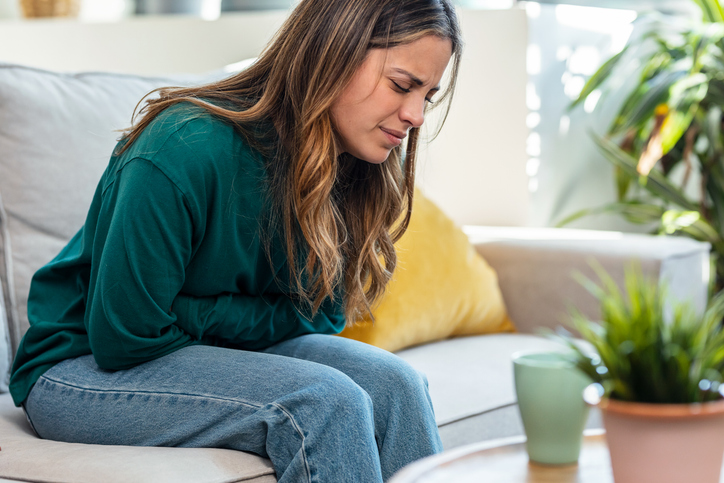Experiencing a miscarriage is a scary and painful time, filled with a rollercoaster of emotions — sadness, fear, loneliness — plus all those uncomfortable and often unfamiliar physical symptoms, like blood clots.
The presence of blood clots, particularly very large ones, can trigger feelings of worry and anxiety. And if you’re unfamiliar with what to expect during a miscarriage, this adds another layer of confusion and concern.
We’ve talked with Massachusetts-based physician Jessica Ryniec, MD, a double board-certified OB/GYN and reproductive endocrinologist, to help you understand what's normal or not when it comes to blood clots and when to contact your healthcare provider.

What's happening in your body during a miscarriage
The American Pregnancy Association defines a miscarriage as a pregnancy that ends on its own within the first 20 weeks of gestation. Most occur during the first 13 weeks of pregnancy. Miscarriages happen for various reasons, the most common being that something just isn’t right with your baby’s chromosomes.
During a miscarriage, your body will likely expel the pregnancy tissue without requiring a medical procedure or intervention. Blood clots, even as large as a golf ball, can be a normal part of this process as your body clears your uterus. “Clots form from bleeding, and those that have a heavier flow, especially post miscarriage, may see more clots than others,” says Ryniec.
Although even significant clotting is considered “normal,” it can be pretty terrifying to experience. The good news? Bodies are amazing, and most of the time, yours knows exactly what to do. “Plasma and platelets work together to prevent the body from losing too much blood during periods, which is how clots form,” explains Ryniec. “Clots also form any time blood is just sitting in a specific space — like the uterus or vagina,” she adds.

Are large blood clots normal?
The bleeding and size of clots can vary from person to person. But it’s completely normal to notice quite large clots resulting from a miscarriage. “If someone is taking it easy while having this first period after a miscarriage and spending much of their time lying down or resting, they may see bigger clots because blood may be more likely to collect and sit in the uterus or vagina, forming a clot that then comes out when they get up,” explains Ryniec.
Ryniec says large clots may be more likely for women with certain conditions like intrauterine polyps, uterine fibroids, abnormal cells in the uterus or cervix, a bleeding disorder, thyroid disease, or other hormone abnormalities. “It can also indicate retained pregnancy tissue if they have just had a miscarriage,” she adds.
Ryniec advises focusing on the frequency and amount of clots, not just their size. Contact your healthcare provider if you experience repeated passing of large clots over several hours or heavy bleeding with clots that require changing your pad or tampon every hour.
In addition, she emphasizes the importance of contacting your healthcare provider if you experience other troubling symptoms like dizziness, significant pain, vomiting, headaches, or noticeable changes from your usual period symptoms or bleeding.

Be patient with yourself and the healing process
Bleeding and clotting after miscarriage should gradually decrease over time. However, it may take your body several weeks to fully recover — and it’s completely normal to not feel like yourself for a while.
“About 20% of people who have had a recent miscarriage have symptoms of anxiety or depression,” says Ryniec. “Symptoms can be similar to postpartum depression and include loss of interest in usual activities, hopelessness, tearfulness, and irritability, among other symptoms,” she adds.
Ryneic recommends adopting a healthy lifestyle, which includes getting plenty of rest, staying well-hydrated, avoiding strenuous activity, and paying close attention to any signs that something might be wrong.
She notes, “Some studies show that supplements like vitamin E, omega 3s, and other vitamins may help.” Always consult your healthcare provider for personalized supplement recommendations and any other concerns.
Ryniec recommends using heating pads, NSAIDs like Motrin, Advil, or ibuprofen, gentle stretching exercises, and lower back massage to manage pain and discomfort. Focus on replenishing your body’s nutrients and eating iron-rich foods like lentils, spinach, or brown rice.
While experiencing golf ball-sized clots after a miscarriage is not uncommon, it’s crucial to pay attention to how your body responds to the significant stress of this event. If any symptoms worry you, don’t hesitate to reach out to your healthcare provider for guidance and reassurance.
Losing a pregnancy is an undeniably challenging experience, but it’s important to remember that it doesn’t diminish your ability to have a baby in the future. Continuing your prenatal supplementation routine is generally a good idea if you’re considering trying to conceive again.
Many women experience the heartbreak of pregnancy loss, and connection with others who truly understand can be a powerful source of healing. We offer a variety of resources and a compassionate Rescripted community support network for comfort and guidance as you navigate this difficult time.
Blair Sharp is a freelance writer who lives in Minnesota with her husband and son. Her words have been published in various publications, including Parents, SheKnows, The Bump, and Insider. Find her writing daily on LinkedIn and check out her weekly newsletter, Hey Freelancer! Head to her website www.blairsharp.com for more.



.jpeg)










.webp)

